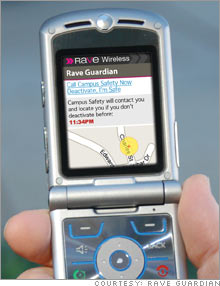After Virginia Tech, security firms ramp upMindful of the Virginia Tech tragedy, some companies are boosting their marketing efforts.NEW YORK (CNNMoney.com) -- In the wake of the massacre at Virginia Tech, security companies are pushing a slew of new products to educational institutions that want new ways to protect their students. Indeed, since the April 16 shooting, security outfits like Omvox Telecom Corp., Send Word Now, NICEVision, Mobile Campus, Ed-Alert, MessageOne and others have issued news releases detailing how their products can stave off or minimize the damage of another Virginia Tech. And the demand is there; Campus emergency text-messaging service Ed-Alert said inquiries regarding its system have risen 90 percent since the shootings.
Many schools are only just beginning to discover the world of security technology. Certainly, surveillance cameras are common on campuses these days, and a number of schools have graduated to slightly more sophisticated security measures, like using e-mail and text messages to send alerts to students. The field is jammed with companies touting their prowess in conventional text-messaging, e-mails and mobile phone alerts. Now campus security outfits are going even more high tech. A slew of contenders Rave Wireless Inc., for example, is touting its Rave Guardian software, a cell phone panic alert that the company says "puts a virtual public safety officer at every student's side when they need it." Students using Rave Guardian software can activate a timer on their mobile phones when they want someone to watch over them, such as when they leave the campus library late at night. Campus security is then notified electronically that the timer has been set. If the user does not deactivate the timer within the specified time period, campus police are notified and can track the student's whereabouts using a global position device. Students using a Rave-enabled device also can alert campus security when they are in trouble, such as during hostage situations, by pushing a panic button. Rave equips campus security offices with plasma screen viewers that display students' pictures and other vital information used to track their whereabouts. The devices can only be installed on phones that support Rave technology, but company CEO Rodger Desai said that Guardian is otherwise not brand-specific. Desai predicted the campus security field will become considerably more crowded since the Virginia Tech tragedy, requiring companies to be innovative. "We won't be the only ones innovating in this space," he said. "Mobile phones can actually step up and be an important part of keeping the community safe." Rave, which has been praised by Security on Campus, a nationwide organization founded in honor of murdered Pennsylvania college student Jeanne Clery, is used by more than 70 schools nationwide, including Montclair State in New Jersey, the University of North Carolina and Cal State University. The University of South Florida a few days ago said it was stepping up efforts to get its students signed up to MoBull Plus, another Rave emergency message service. The security firm NICE Systems, which has video cameras monitoring 85 percent of public places in New York City, is pushing its NICEVision system, a video surveillance setup that goes beyond merely recording events and instead analyzes action by dissecting the speed, direction and duration of frame-by-frame activity and can set off alarms accordingly. The system already is in more than 100 schools. NAPCO Security Systems (Charts) offers a panic-button device similar to Rave's, that are on keychains or pendants. The NAPCO system, which uses radio waves to find student locations, is in use at dozens of schools including Brigham Young and New York City's Columbia University. Another firm, Mobile Campus, offers a free emergency text-messaging service on campuses where Mobile is already a carrier. More than technology Not everyone is enlisting high-tech security firms in the quest to make their campus safer. Experts at Security on Campus recommend an approach that combines technology and communication improvements. Group spokesman S. Daniel Carter said he has seen a rapid response from schools looking to increase their security since the Virginia Tech tragedy. Security on Campus was responsible for congressional passage of the Clery Act, which requires detailed and timely crime reports from campus law enforcement agencies. The organization closely monitors security issues at colleges and universities and often files complaints against those schools that don't comply. He said establishing a clear communication network is the most important aspect of mobilizing for a crisis. "It's not just a matter of technical aspects," Carter said. "Probably the most important component is having clear communication protocols for internal personnel, security personnel and outside law enforcement." |
Sponsors
|

